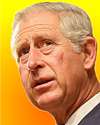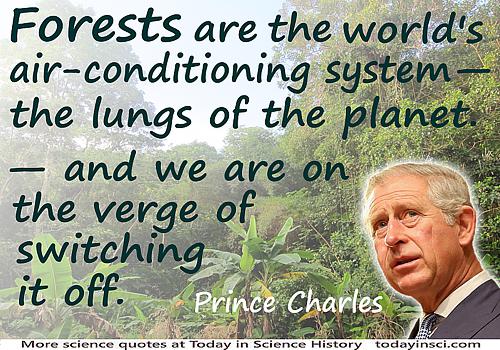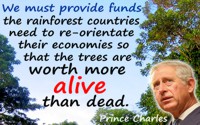 (source)
(source)
|
Charles, Prince of Wales
(14 Nov 1948 - )
British prince who, while heir apparent to the British throne, takes an active interest in civic issues such as architecture, the environment, education and disadvantaged people.
|
Prince Charles - Deforestation Quote
“Forests … Are the Very Lungs of the Planet”
Illustrated Quote - Medium (500 x 350 px)

More Prince Charles quotes on science >>
The Context of Prince Charles' “Lungs of the Planet” Quote
In Nov 2008, the Prince of Wales delivered the Presidential Lecture, at the Presidential Palace, Jakarta, Indonesia. He began by noting that he would in a week's time have his sixtieth birthday, while it was also sixty years since Independence for Indonesia. He acknowleged that Indonesia had transformed into the world's third largest democracy.
He then introduced his main theme, the stewardship of Nature, the global concern with climate change, and the need for the whole world to unite and “with a real sense of urgency and resolve to act together.” He appreciated that “it is not just a question of environmental protection but also one of social justice and community empowerment.”
“However, we need to be realistic. There is very little we can do now to stop the ice from disappearing from the North Pole in the Summer. And we probably cannot prevent the melting of the permafrost and the resulting release of methane. In addition, I fear that we may be too late to help the oceans maintain their ability to absorb carbon dioxide. But there is something we can do—and it could make the whole difference and buy us time to develop the necessary low carbon economies.
We can halt the destruction of the world’s rainforests—and even restore parts of them—in order to ensure that the forests do what they are so good at—in other words storing carbon naturally. This is a far easier, cheaper and quicker option than imagining we can rely on as yet unproven technology to capture carbon at a cost of some $50 per tonne or, for that matter, imagining we can achieve what is necessary through plantation timber.
As you know better than anyone, these forests therefore act as giant global utilities, providing essential public services to the whole of humanity. They are in fact the world’s air-conditioning system—the very lungs of the planet—and help to store the largest body of freshwater on the planet—water which, we have to remember, is essential to produce food for our planet’s growing population. The rainforests of the world also provide the livelihoods of more than a billion of the poorest people on this Earth, including many here in Indonesia. In simple terms, the rainforests, which encircle the world, are our very life-support system—and we are on the verge of switching it off.”
“Nine per cent of the world’s remaining tropical rainforests are, of course, under Indonesia’s stewardship and so it is no exaggeration to say that your natural heritage is absolutely critical to the survival of us all.”
The Prince congratulated the Indonesian President for the initiatives he had taken to address the problems. Then the Prince explained the Rainforests Project he had started to help with funding, because:
“the rainforest countries need to re-orientate their economies so that the trees are worth more alive than dead.”
For the remainder of his time, Prince Charles addressed how he believed the governments, companies and institutions around the world could become involved in constructive actions and the possible approaches to raising financial assistance. He concluded with his promise that:
“I, for one, am determined to do everything in my power to ensure that this future is not snatched from our children and grandchildren.”
Deforestation illustrated quote, “Earth, Skinned Alive” >>
More Deforestation Quotes >>
- Science Quotes by Charles, Prince of Wales.
- Prince Charles - Context of the “Forests are the worlds air-conditioning system” quote - with large image (800 x 600px).
- Prince Charles - Context of the “Rainforest countries need to re-orientate their economies so that the trees are worth more alive than dead” quote - with medium image (500 x 350px).
- Prince Charles - Context of the “Rainforest countries need to re-orientate their economies so that the trees are worth more alive than dead” quote - with large image (800 x 600px).






